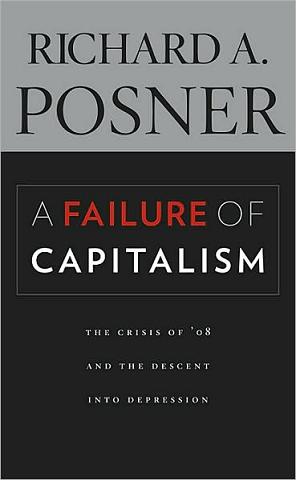
波斯纳新书《资本主义的失败》及该书博客
 A Failure of Capitalism: The Crisis of ’08 and the Descent into Depression, by Richard A. Posner. Harvard University Press 2009. ISBN-10: 0674035143; ISBN-13: 9780674035140
A Failure of Capitalism: The Crisis of ’08 and the Descent into Depression, by Richard A. Posner. Harvard University Press 2009. ISBN-10: 0674035143; ISBN-13: 9780674035140
From the Publisher
The financial and economic crisis that began in 2008 is the most alarming of our lifetime because of the warp-speed at which it is occurring. How could it have happened, especially after all that we’ve learned from the Great Depression? Why wasn’t it anticipated so that remedial steps could be taken to avoid or mitigate it? What can be done to reverse a slide into a full-blown depression? Why have the responses to date of the government and the economics profession been so lackluster? Richard Posner presents a concise and non-technical examination of this mother of all financial disasters and of the, as yet, stumbling efforts to cope with it. No previous acquaintance on the part of the reader with macroeconomics or the theory of finance is presupposed. This is a book for intelligent generalists that will interest specialists as well.
Among the facts and causes Posner identifies are: excess savings flowing in from Asia and the reckless lowering of interest rates by the Federal Reserve Board; the relation between executive compensation, short-term profit goals, and risky lending; the housing bubble fuelled by low interest rates, aggressive mortgage marketing, and loose regulations; the low savings rate of American people; and the highly leveraged balance sheets of large financial institutions.
Posner analyzes the two basic remedial approaches to the crisis, which correspond to the two theories of the cause of the Great Depression: the monetarist—that the Federal Reserve Board allowed the money supply to shrink, thus failing to prevent a disastrous deflation—and the Keynesian—that the depression was the product of a credit binge in the 1920’s, a stock-market crash, and the ensuing downward spiral in economic activity. Posner concludes that the pendulum swung too far and that our financial markets need to be more heavily regulated.
Table of Contents
1. The Depression and Its Proximate Causes
2. The Crisis in Banking
3. The Underlying Causes
4. Why a Depression Was Not Anticipated
5. The Government Responds
6. A Silver Lining?
7. What We Are Learning about Capitalism and Government
8. The Economics Profession Asleep at the Switch
9. Apportioning Blame
10. The Way Forward
11. The Future of Conservatism
* Conclusion
* Further Readings
* Index
Publishers Weekly
Posner (How Judges Think) is uncharacteristically dry in this dense book that states flatly that we are in a recession only because we are too frightened to call it a depression. He makes a near-heroic attempt to delve into the roots of the current crisis, citing some of the harder questions: how did it happen? why was it not anticipated? how is the government responding? A great deal of ground is covered, and the book takes the form of a high-altitude survey, assessing all the major points without getting bogged down in detail. Quickie explanations of subprime mortgages and the credit crunch orient the reader, and Posner addresses the takeaway lessons about capitalism and government, the puzzling lack of foresight from the economist community, the apportioning of blame and the resulting future of conservatism. All good topics, thoroughly and thoughtfully presented, but much of Posner’s material is already woefully out of date. This book will make a serviceable study of the current crisis, but it does not serve its intended audience well in the meantime. (May)
Copyright © Reed Business Information, a division of Reed Elsevier Inc. All rights reserved.
Lucy Heckman – Library Journal
With the stock market tumbling and the unemployment rate rising, the current financial crisis is dominating the headlines. Prolific author Posner (circuit judge, the U.S. Court of Appeals, Seventh Circuit; senior lecturer, Univ. of Chicago Law Sch.; How Judges Think) examines the causes and consequences of the financial crisis as well as governmental measures aimed at dealing with it. In the first five chapters, he explores how and why the economy “has gotten itself into such a fix and what the government is trying to do to get the economy out of it and how likely it is to succeed.” The final six chapters describe the lessons that can be learned from the crisis and ways to avoid the next depression. The text is current to the early days of the Obama administration. Highly recommended for both general readers and students as a top title among the growing number of books about the current crisis.
作者为及时更新该书内容,还专为此书新设了一个博客:A Failure of Capitalism。
But because I am writing in medias res, I have decided to create a blog (I will call it “The Posner Economic Crisis Blog”) in which I will blog weekly on the crisis, beginning a week after the publication of this book, in effect continuously updating the book. Comments from readers will be welcomed and posted, and I will respond to as many of the most insightful or informative comments as my time permits.
——理查德·波斯纳:《资本主义的失败》前言